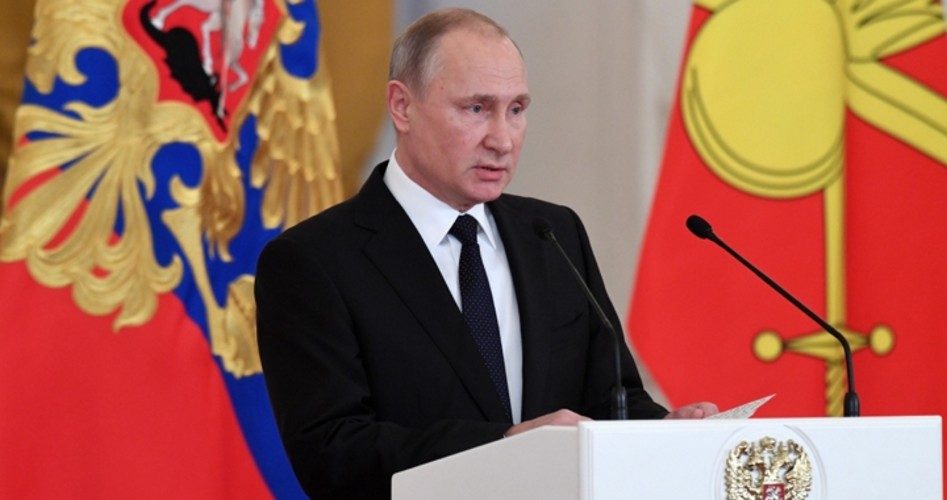
Speaking at an awards ceremony in the Kremlin on December 28 for veterans of Russia’s Syria campaign, Russian President Vladimir Putin said a bomb blast in a St. Petersburg supermarket the previous day was an act of terrorism.
“You know that yesterday in St. Petersburg a terrorist act was carried out,” Putin told the attendees.
The Russian president told those attending the ceremony that the Federal Security Service (FSB) had also prevented “another attempted terrorist act.”
A Kremlin spokesman told Reuters that the thwarted attack Putin referenced was the one earlier this month that targeted St. Petersburg’s Kazan Cathedral.
Putin served as director of the FSB — the successor to the Soviet-era KGB — from 1998-1999, after being appointed by former Russian Federation President Boris Yeltsin. Putin joined the KGB in 1975 and resigned with the rank of lieutenant colonel in 1991. As we shall discuss further, the Russian leader’s KGB background may cause many to question his legitimacy as a purported champion in the war against terrorists.
The Russian state news agency TASS reported that Putin remarked that the state security services should work to arrest those responsible for the bombing according to the law, but if they posed an immediate danger to others they should be “liquidated on the spot.”
During his remarks to the veterans of Russia’s campaign in Syria against ISIS forces, Putin said that he had already given the order to “kill bandits” to the head of the FSB. He also remarked on the danger of ISIS radicals coming to Russia from Islamic State-controlled territory. He posed the question: “What would have happened if these thousands, hundreds, returned to us and returned trained, armed, well-trained?”
Breitbart cited a report from Fontanka (the local Saint Petersburg state news agency) noting that security camera footage showed the alleged attacker walking into the supermarket with a backpack, which he placed in a storage locker before quickly leaving the premises. The suspect, seen wearing a green hooded shirt, is described as being of “non-Slavic” appearance, with brown hair. After leaving the backpack with the explosive device, he reportedly hid among the crowds of shoppers preparing for Russian Orthodox Christmas, which is celebrated on January 7, outside the shop until the device exploded.
Reuters reported that investigators have opened a criminal case into the blast, which they said was caused by a homemade bomb packed with pieces of metal.
Earlier this month, the FSB reportedly prevented an attack targeting Kazansky Cathedral, based on intelligence information provided by the CIA to the FSB. Putin called President Trump to thank him for this assistance. A readout of this call, posted on the White House website, stated that, based on the information provided by U.S. intelligence, “Russian authorities were able to capture the terrorists just prior to an attack that could have killed large numbers of people.”
However, as The New American has reported previously, and as we note below, Putin’s FSB has been exposed as the real hand behind many of Russia’s most sensational and deadliest terrorist attacks. For this reason, all proposals for increased “partnership” and “cooperation” with the still-communist Russian state “should be viewed with extreme skepticism,” according to William F. Jasper, The New American’s senior editor, who has written extensively on terrorism and U.S.-Russian relations over the past four decades. “The claim by Putin and the FSB that U.S. assistance helped foil an alleged terror attack, should be viewed as a ‘chess move’ aimed at furthering a larger, long-term objective,” Jasper noted. “American globalists and Soviet communists have been attempting a ‘convergence’ of U.S. and Russian intelligence and counter-terrorism since the Gorbachev ‘Perestroika’ era,” he reminded us.
While the cooperation between our intelligence agencies and Russia’s FSB in fighting terrorists is cited by many observers as a sign of encouragement in the war against terrorism, extreme caution is also called for. It is important to remember that the FSB is a successor intelligence organization to the old, much-dreaded Soviet-era KGB. The FSB even occupies the notorious headquarters of the KGB on Lubyanka Square in downtown Moscow.
While the organization that succeeded the KGB may be seen as rather benign compared to the brutal terrorists of ISIS, we should still be wary of cooperating, in any way, with the rebranded mass-murdering organization that tortured and executed millions of people and sent millions more political prisoners to the Gulag described by the historian Aleksandr Solzhenitsyn. Solzhenitsyn had to finish his famous work, The Gulag Archipelago, covertly, after the KGB confiscated his materials.
Photo of Vladimir Putin: AP Images
Related articles:
Putin Thanks Trump for CIA Intel That Reportedly Foiled Terror Plot in Russia
Trump Boots Putin’s KGB Tech Guru Kaspersky Out of Fedgov Computers
Chechen Terrorism: Made in Moscow
Hizb ut-Tahrir: KGB-FSB Connection?
INTERPOL Taps KGB Tech Wizard Kaspersky for Internet Security
Putin Paints Russia as Defender of Traditional Values, Blasts West
Trust KGB’s Kaspersky for Cybersecurity, Says Bloomberg’s Bershidsky
Who’s in Putin’s Pocket — Clinton or Trump?
Putin’s KGB/FSB Converging with New IMF Banking FSB
Russian Troops Coming to U.S. for Terror Drills, DoD Confirms


